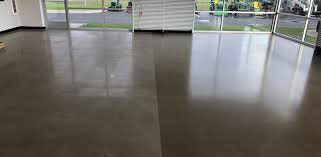CONCRETE FLOOR SEALING
FLOORS THAT REQUIRE CONCRETE SEALING
Typical areas that would benefit from either coating or impregnator sealing include floors subjected to medium or heavy forklifts and tow motor traffic: in warehouses, distribution centers, automotive assembly plants, manufacturing plants, textile mills, coolers and freezers, food processing plants, service garages, grocery stores, discount retail stores, hub transfer facilities, commercial buildings, and most concrete floors needing rehabilitation.

Other uses include concrete floors in public places subjected to frequent or heavy pedestrian traffic, such as: civic centers, retail sales outlets, discount stores, restaurants, sports arenas, stadiums, hospitals, airports, museums and schools.
WHY WE SEAL CONCRETE FLOORS
Concrete Polishing & Sealing provides resin epoxy installation, traffic coating, sealing, hardening, densification, and water proofing services. Despite its durability, concrete is a porous material, which means it can absorb water, chlorides, stains, and other water and oil base materials.
Concrete is typically sealed with either a film forming sealer (topical coating) or with penetrating sealer (impregnator). Advantages of coatings include they are seamless, sanitary clean, impermeable, resistant to high traffic, resistant to alkalis, acids and aggressive chemicals.
SEALING CONCRETE FLOORS IS A MULTI-STEP PROCESS.
For coating of concrete floors we use a BASF and SIKA three step process comprising of priming followed by coating the surface with a self-leveling two-part epoxy application. We then seal the floor with high flexibility polyurethane top coat aliphatic polyurethane which is resistant to U.V., yellowing and high abrasion.
For impregnation of concrete matrix we suggest various sodium silicate or lithium hardeners, specially formulated concrete densifiers to increase the wear resistance and surface strength of concrete.










